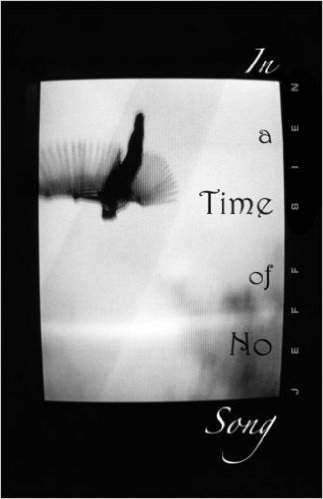Review by Jessica Torrens
In A Time of No Song
By Jeff Bien
Exile Editions, 2015
In this abundant volume of free verse, and his previous collection, A Taste of Creation, Jeff Bien works a rapturous magic by pushing together the sacred and the mundane; uncovering images, sometimes startling, to evoke the ephemeral, the indescribable, the ecstasy of mystics. In the face of all of the modern challenges to faith and hope, here we find a tenacity, a voice in the darkness: “In the scrapyard of prayer, a holy rascal,… and I its nagging singer.” (4)
The sheer size of this volume in ten parts is impressive, woven through with reflections on eternity, inequality, the role of art, suffering and mortality. It lags slightly in the middle from the brilliance of its early and later chapters in which the images strike a chord and hold more coherently to a subject. The opening and title chapter of poems won the 2014 Gwendolyn MacEwen Award for Poetry.
Bien is a poet for poets, for quiet observers of nature, for those with a wry sense of the irony of our manic quest for meaning in an age of despondency. Most of all, he is a poet for seekers. For anyone who has ever thumbed the smooth knobs on a string of meditation beads. For anyone who has tried to meditate and sat both painfully aware of time, and yet found seconds strangely spacious. For anyone who has ever sat in a mindfulness class and pondered the perplexing instruction to ‘hear the sound of the room without trying to listen.’ Bien speaks volumes.
“Listen,” recalls Kafka’s poem, “Learn to be Quiet”. Here the idea of witnessing is achieved through paying attention to the sound of natural phenomena that can scarcely be heard. Bien comes again and again to the gargantuan simplicity of the meditator’s task.
Listen to the sermon of the bell
Listen to the auburn days of the white elm
Listen to the tiniest leaves, the braille of small roses counted like mala beads
Twigging the soundless sound, imaginary hollows cribbed in secrets.
…
Listen to the death of the second hand, the minute hand, the hour hand.
…
Listen to the children, the shoreless cries from the shanty town, …
Listen deeply to your own listening, listen, without listening, and be heard. (20-21)
In the tradition of medieval South Asian poet, Kabir, Bien blends imagery across multiple spiritual traditions, Judaism, Christianity, Islam, Buddhism and Hinduism, celebrating them although wry of dogma, while hunkering down always to the simplest kernel of truth within and perhaps beyond them all. He describes the union of the mystic by borrowing images from scripture, and insinuates a yogic union in which the singer becomes the song and the seeker merges with the sought.
Slowly we run into the burning bush
To recite the names of emptiness and be that sailing fire. (8) [emphasis added]
And yet, like all devotional poets, Bien knows the torturous sweetness of yearning. In fact, I find these passages the most haunting, the passages that speak to the human condition, the long patient hope of glimpsing again some crystalline state of wholeness:
The way a prisoner not yet free sings in her unanswerable darkness
And a bird with paper wings has crept through the bars
Quietly pleading, carrying a note that has no name. (9)
Many of the poems play with the idea of soundless sound, harkening after the unstruck sound in South Asian wisdom traditions, the cosmic vibration that exists at the base of everything, that which our truest syllables seek to echo. Bien gets at the ephemeral concept of God as witness with lines like, “in the nothingness that listens”, and “the word made flesh that watches over love”. (7) As well as, “So too, I sing that which sings me, in a time of no song.” (5)
This title phrase, in a time of no song, plays both on the lonely reality of a mystic in an era of skepticism. But also, the time of no song points to the fundamental paradox of an eternal vibration, a sourceless thrumb so subtle, it is experienced as no-thing, no-practice, no-time, no-song. Throughout, the poet juxtaposes the idea of the power of the unspoken word and “the throat song of ecstasy.” In “After Rumi” we sense the poet’s struggle with voicing.
Who am I to solve the tempting cry of all of mind
When the heart opens like winter tulips, swans in their Sunday clothes.
And you, a grainy picture of wishless thinking sounds,
That has died a thousand deaths before. (121)
And yet there is a sense that the word is eternal, and the poetry has the power to outlive the poet: “Where now is that voice in this dying body, slowly to be unseen.” (159) Bien doesn’t turn away from suffering—his own, or that of the world. Rather, facing the cries of the mind, and the cries from the shanty town, staring down mortality, grounds us to what is essential.
Death haunts old men
Who carry this dream like a fool, and mutter to themselves their last hours
While everywhere suffering tightens the reigns, star loops in far and broken places
Until we see, tethered in the death ground of the heart, the poem’s true face. (161)
And, in love, though aware of the inevitability of change and loss, Bien finds respite, and perhaps a doorway to eternity.
If I say that I love you, the world must bend
As a rainbow, and the last day will go on forever. (137)
Jessica Torrens is a student in the University of British Columbia’s MFA program. She writes blog pieces and articles on yoga and holistic living, is a CanLit enthusiast, and is currently working on a novel set in South Korea. www.HoldingTheInvisibleString.com